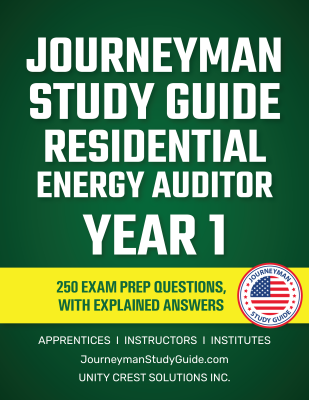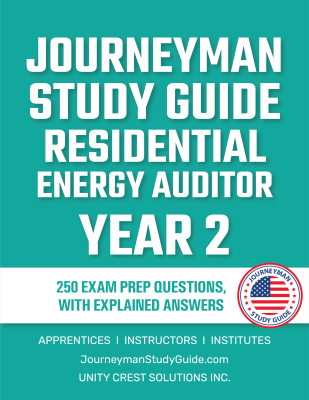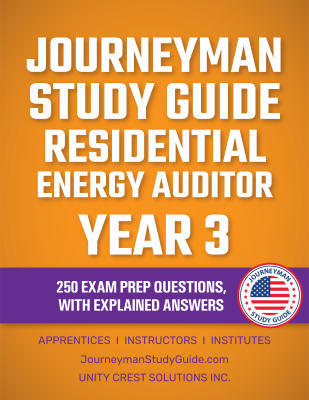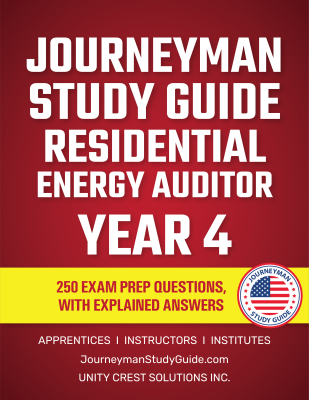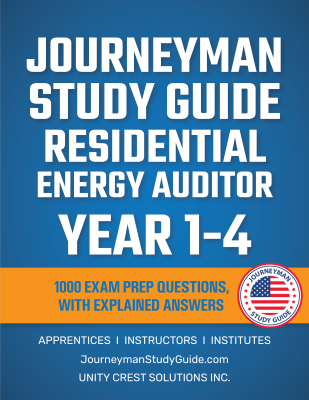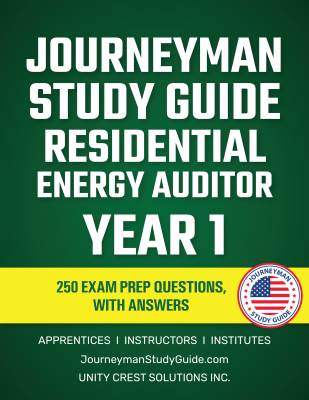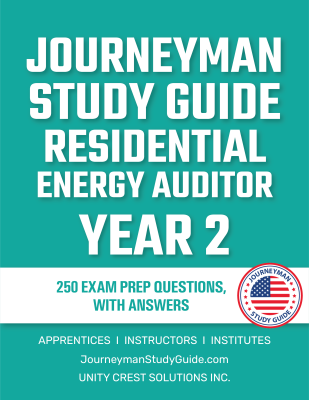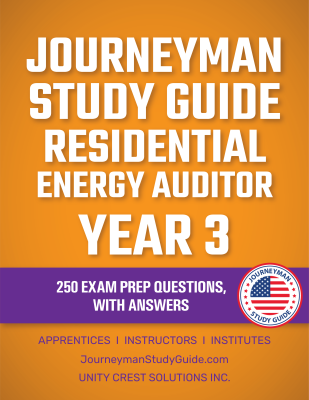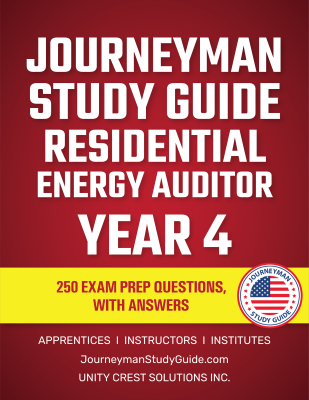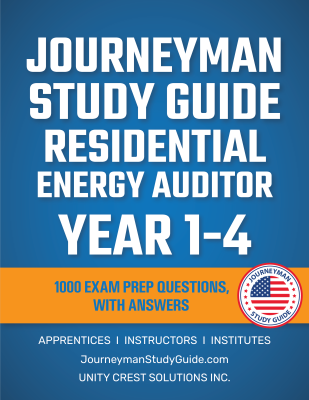Questions, Answers, & Explanations
Get clear explanations behind every answer, perfect for deeper learning and more thorough exam preparation.
Site Updates in Progress: Things might look different as we work on enhancing your experience.
A Residential Energy Auditor plays a crucial role in improving the energy efficiency of homes across the United States. This profession is in high demand as homeowners, builders, and government agencies alike strive to reduce energy consumption and lower utility costs. Energy auditors assess the energy use of residential buildings and provide recommendations on how to improve energy efficiency, reduce waste, and lower the environmental footprint.
What Does a Residential Energy Auditor Do?
The main responsibility of a Residential Energy Auditor is to evaluate homes for energy efficiency and recommend cost-effective solutions to improve it. This involves a thorough assessment of a home’s heating, cooling, lighting, insulation, and ventilation systems. Energy auditors also conduct diagnostic tests, such as blower door tests and thermal imaging, to identify areas where energy is being wasted.
Using specialized equipment, an energy auditor will assess the home’s insulation, windows, doors, air leaks, and appliances. These factors can significantly impact a home’s energy consumption. Once the audit is complete, the auditor provides a detailed report that outlines the energy-saving opportunities, along with estimated costs and savings. These recommendations can range from simple fixes, such as replacing weather stripping on windows, to more significant improvements like upgrading insulation or installing energy-efficient windows and doors.
Why is Residential Energy Auditing Important?
With rising energy costs and increasing concerns about climate change, energy efficiency has become a priority for homeowners across the U.S. Residential energy audits help homeowners lower their energy consumption, save money on utility bills, and make their homes more comfortable. Additionally, by identifying and fixing inefficiencies, energy auditors contribute to reducing the carbon footprint of homes, which is crucial in the fight against global warming.
Energy audits also play a key role in compliance with government programs and incentives. Many local, state, and federal programs offer rebates and tax credits to homeowners who implement energy-efficient upgrades. Energy auditors are often involved in guiding homeowners through these programs and ensuring that their homes qualify for these benefits.
Key Skills of a Residential Energy Auditor
A successful residential energy auditor must possess a blend of technical knowledge and communication skills. On the technical side, a deep understanding of building systems, energy-efficient technologies, and diagnostic equipment is essential. The auditor must be skilled at performing energy assessments and interpreting the data gathered from these assessments.
Excellent communication skills are equally important. Energy auditors must be able to explain complex technical information to homeowners in a clear and concise manner. They must also be able to provide practical, actionable recommendations that are within the homeowner’s budget. Strong problem-solving skills are vital, as every home is unique and may present different energy challenges.
Work Environment and Employment Opportunities
Residential Energy Auditors typically work in the field, traveling to homes to perform energy assessments. The work environment can vary, as energy audits are performed in all types of homes, from single-family houses to larger multi-unit buildings. Energy auditors may be employed by private firms, government agencies, or energy utilities. Some may also work as independent contractors.
This career provides the opportunity to work in a growing field with the potential for job stability. As energy efficiency becomes more of a priority, especially with increasing environmental regulations, the demand for skilled energy auditors is expected to rise. Additionally, many auditors work with green building certifications and energy programs, which further expands their career opportunities.
Conclusion
Residential Energy Auditors play a vital role in making homes more energy-efficient and environmentally friendly. This profession requires a mix of technical expertise and effective communication, as auditors must provide homeowners with solutions to reduce energy consumption and lower costs. The demand for energy audits is increasing, driven by rising energy costs, environmental concerns, and government incentives. For those interested in working in a meaningful and growing field, becoming a Residential Energy Auditor offers both a rewarding career and the opportunity to contribute to a more sustainable future.
Becoming a certified Residential Energy Auditor requires passing an examination that assesses your knowledge and skills in evaluating the energy efficiency of residential buildings. This certification ensures that energy auditors are equipped with the expertise needed to perform thorough energy assessments and recommend energy-saving solutions. In this section, we will explore the details of the Residential Energy Auditor exam, including its structure, topics covered, and how to prepare for it.
Certification Requirements
To become a certified Residential Energy Auditor, you must meet certain prerequisites. While the specific requirements may vary depending on the certifying body, the most recognized certification in the United States is offered by the Building Performance Institute (BPI). BPI offers a Certified Building Analyst (CBA) certification, which is commonly pursued by aspiring energy auditors.
Before taking the exam, you typically need to complete the required training, which can be done through in-person or online courses. Training programs often include both classroom learning and hands-on experience in performing energy audits. In some cases, work experience in the energy or construction industries may be required, though this is not always mandatory.
Exam Structure
The Residential Energy Auditor exam is typically divided into two parts: a written test and a practical assessment.
Exam Duration
The duration of the exam varies depending on the certifying body. The written exam typically takes around 2 to 3 hours to complete, while the practical exam may last several hours, depending on the complexity of the audit and the number of tasks you need to complete.
Passing Score and Certification
To pass the exam, you generally need to achieve a score of at least 70% or higher, though this can vary depending on the certifying body. If you pass both the written and practical portions, you will receive your certification. This certification is valid for a set period, usually 3 years, after which you will need to recertify by taking continuing education courses and possibly re-taking the exam.
Preparation for the Exam
Preparing for the Residential Energy Auditor exam requires a comprehensive understanding of building science, energy efficiency technologies, and auditing techniques. Below are some tips for preparing:
Conclusion
The Residential Energy Auditor exam is a comprehensive test of your knowledge and practical skills in energy auditing. By preparing thoroughly and gaining the necessary training and experience, you can earn the certification that will enable you to pursue a rewarding career in energy efficiency. Passing the exam not only demonstrates your competence but also positions you as a professional capable of helping homeowners reduce their energy consumption and lower their utility bills.
When preparing for the Residential Energy Auditor certification exam, understanding the types of questions you will face is crucial. The exam is designed to test your knowledge of energy auditing principles, building science, energy-efficient technologies, and your ability to apply practical skills in a real-world setting. This section will give you an overview of the types of questions you can expect, providing you with a better understanding of how to prepare for the exam.
Question Types
The Residential Energy Auditor exam typically includes multiple-choice questions (MCQs) that cover a wide range of topics. These questions test both your theoretical knowledge and your practical understanding of energy auditing. Below are the primary categories and examples of the types of questions that you may encounter:
How to Prepare for the Exam Questions
To prepare effectively for the exam questions, you should focus on both the theoretical and practical aspects of energy auditing. Here are some tips to help you study:
Conclusion
The Residential Energy Auditor exam is designed to assess both your theoretical knowledge and practical skills in energy auditing. By preparing for questions on energy assessment techniques, building science, energy-efficient solutions, building codes, and safety protocols, you will be well-equipped to pass the exam. Remember to review study guides, take practice tests, and stay current with industry standards. With focused preparation, you can successfully become a certified Residential Energy Auditor and advance your career in the energy efficiency field.
A day in the life of a Residential Energy Auditor is dynamic and requires a combination of technical expertise, problem-solving skills, and communication abilities. As an energy auditor, your primary role is to assess homes for energy efficiency, identify areas where energy is being wasted, and recommend improvements that can help homeowners save on their utility bills while also reducing their environmental impact. Below is an overview of what a typical day might look like for a Residential Energy Auditor working in the United States.
Morning: Preparation and Planning
The day often starts early, with the first task being to prepare for the scheduled energy audits. Energy auditors typically work for firms that handle several audits a day or may be self-employed and manage their own schedules. Before heading to the first job site, an auditor will review the appointment details, including the address, any specific concerns the homeowner has mentioned, and any relevant documentation.
Auditors may also review previous assessments, if applicable, to ensure they are up to date on the home’s history of energy usage and any previous recommendations. Depending on the company or certification requirements, the auditor may need to check their equipment, such as blower door tests, infrared cameras, and other diagnostic tools, to make sure everything is in working order.
Mid-Morning: On-Site Assessment
The majority of a Residential Energy Auditor’s day is spent on-site performing energy audits. Upon arrival, the auditor begins by meeting with the homeowner to discuss any concerns and gather information about the home’s energy usage. Homeowners may mention high utility bills, uncomfortable rooms, or areas they suspect are losing heat or cooling. This initial conversation helps the auditor understand the key areas to focus on.
After gathering this information, the auditor starts with a visual inspection of the home, looking for visible signs of energy loss. They will assess the insulation in attics, basements, and crawl spaces, checking for any gaps, weak spots, or areas where the insulation might be inadequate. The auditor will also examine windows and doors to see if they are properly sealed or if there are noticeable air leaks.
The next step is often performing diagnostic tests. The blower door test, for example, is one of the most common tools used by energy auditors. It involves temporarily sealing a doorway and using a powerful fan to create a pressure difference, which helps identify air leaks. Infrared thermography is another useful tool, allowing the auditor to see temperature differences in the building’s structure and pinpoint areas where heat may be escaping.
Other assessments include checking HVAC systems, testing for proper ventilation, and inspecting the home’s appliances for energy efficiency. These inspections help the auditor understand the overall performance of the home’s systems, which contributes to an accurate evaluation of the home’s energy efficiency.
Afternoon: Data Analysis and Report Writing
After completing the fieldwork, the energy auditor returns to the office or their home office to compile and analyze the data collected during the day’s assessments. This is where the technical knowledge comes into play, as the auditor must interpret the data and make informed recommendations for improvement.
Based on the findings, the auditor will prepare a detailed report for the homeowner. This report will outline the current energy performance of the home, identify areas of inefficiency, and suggest practical, cost-effective improvements. Recommendations could include adding insulation, sealing air leaks, upgrading appliances, or improving the home’s HVAC system.
The auditor’s ability to clearly communicate these findings is essential. The report must be easy to understand for homeowners who may not have a technical background. Along with the recommendations, the auditor will often provide estimated costs for the improvements and the potential savings on energy bills. In some cases, the report might also include information about available rebates or tax credits for energy-efficient upgrades.
Late Afternoon: Follow-Up and Client Communication
In the final part of the day, the auditor may follow up with homeowners or clients, answering any questions they have about the findings or recommendations. Clear communication is key to ensuring the homeowner understands the steps they need to take. The auditor may also schedule a follow-up visit to inspect the implementation of recommended upgrades or to conduct additional tests if needed.
If the auditor works for a company, they might also spend time communicating with other team members, scheduling future appointments, or reviewing additional client files. For independent contractors, this time could be spent handling business-related tasks, such as managing invoices, marketing their services, or networking.
End of the Day: Wrapping Up
By the end of the day, a Residential Energy Auditor will have completed the necessary fieldwork, data analysis, and reporting. While the work can be physically demanding, especially when moving between homes or working in attics and crawl spaces, it is also highly rewarding. The role of an energy auditor helps homeowners make informed decisions about their homes’ energy performance, save money, and contribute to environmental sustainability.
Every day is different, as each home presents unique challenges and opportunities for improvement. The variety of tasks and the ability to see the direct impact of one’s work makes the day-to-day responsibilities of a Residential Energy Auditor both interesting and fulfilling.
A career as a Residential Energy Auditor offers numerous opportunities in the growing field of energy efficiency. As awareness about climate change and energy conservation increases, the demand for professionals who can help homeowners reduce energy consumption is steadily rising. This section outlines the career path of a Residential Energy Auditor, including job opportunities, career progression, and the skills required to succeed.
Starting Your Career
To begin a career as a Residential Energy Auditor, you will need a solid foundation in building science, energy efficiency, and assessment techniques. Many energy auditors start by completing a formal training program. These programs are available through community colleges, technical schools, or online courses. They cover topics such as energy auditing, HVAC systems, building insulation, energy-efficient appliances, and safety protocols. Some training programs also offer hands-on experience, allowing you to conduct real-world energy audits.
In addition to training, obtaining certification is a key step. Certification from organizations like the Building Performance Institute (BPI) or the Residential Energy Services Network (RESNET) is highly recommended. These certifications validate your expertise and can make you more attractive to potential employers or clients. While certification is not always required, it is an industry standard and can increase your job prospects.
Entry-Level Positions
Once you’ve completed your training and obtained certification, you can begin working as a Junior or Assistant Energy Auditor. In these entry-level positions, you will typically work under the supervision of more experienced auditors. You will assist with conducting energy assessments, gathering data, and preparing reports for clients. This stage of your career is a great time to gain practical experience and refine your skills.
As an entry-level auditor, you will also familiarize yourself with the tools and technology used in energy audits, such as blower door tests, infrared cameras, and energy modeling software. Your day-to-day tasks will include inspecting homes, identifying energy inefficiencies, and suggesting simple improvements like sealing air leaks and upgrading insulation.
Mid-Level Positions
After gaining experience and working as a Junior Energy Auditor, you can advance to a full-time Residential Energy Auditor. In this role, you will have more responsibility, including conducting independent energy audits, interacting directly with clients, and providing detailed recommendations for energy improvements. You will be expected to analyze data from assessments, prepare reports, and discuss findings with homeowners in an understandable manner.
With experience, you may also start specializing in certain areas, such as working with specific building types (e.g., multi-family homes) or offering expertise in renewable energy solutions like solar panels or geothermal systems.
Advanced Roles and Specializations
As you continue to build your career, there are opportunities to take on advanced roles or specialize in particular areas of energy efficiency. For instance, you could become a Senior Energy Auditor, where you’ll be responsible for managing larger projects and leading a team of auditors. Senior auditors often work with larger commercial clients or handle complex energy audits, such as those for newly constructed buildings or government-funded programs.
Alternatively, you could specialize in a particular area of energy efficiency, such as HVAC systems, insulation, or renewable energy solutions. By gaining additional certifications and experience, you can position yourself as an expert in these fields.
Career Advancement and Entrepreneurship
Energy auditors can also pursue leadership roles within energy auditing firms, such as becoming a Project Manager or Energy Audit Supervisor. In these roles, you will manage a team of auditors, oversee large-scale energy efficiency projects, and ensure that audits are conducted to the highest standards.
For those interested in entrepreneurship, becoming an independent contractor or starting your own energy auditing business is a viable option. As an independent energy auditor, you’ll have the flexibility to set your own schedule, work directly with clients, and grow your business by marketing your services to homeowners and commercial properties.
Job Outlook and Salary Potential
The demand for Residential Energy Auditors is expected to grow as more people look to improve their homes’ energy efficiency. According to the U.S. Bureau of Labor Statistics, jobs in energy efficiency and related fields are increasing, and professionals with certifications in energy auditing are particularly sought after. The median annual salary for a Residential Energy Auditor ranges from $50,000 to $70,000, depending on experience, location, and whether you work independently or for a company.
Overall, a career as a Residential Energy Auditor offers long-term growth potential, competitive salaries, and the opportunity to contribute to environmental sustainability. Whether you prefer to work for a company or pursue an independent career, this field provides numerous pathways for success.
A career as a Residential Energy Auditor offers competitive wages, with potential for growth as you gain experience and certifications. Salaries can vary based on factors such as experience, location, and the employing organization. Below is an overview of current wage expectations for Residential Energy Auditors in the United States.
Average Salary
As of May 2025, the average annual salary for a Residential Energy Auditor in the United States is approximately $76,867, according to Salary.com. Salaries typically range from $67,555 to $86,229, with the median falling around $76,867.
Hourly Wage
Hourly rates for Residential Energy Auditors vary depending on experience and location. On average, hourly wages range from $24 to $30. For instance, ZipRecruiter reports that the average hourly pay for a Certified Energy Auditor is $24.01.
Entry-Level Positions
For those just starting in the field, entry-level positions offer competitive wages. According to CareerExplorer, entry-level energy auditors earn approximately $57,164 per year. These roles provide valuable experience and can serve as a stepping stone to higher-paying positions.
Mid-Level Positions
With a few years of experience, Residential Energy Auditors can expect to earn higher salaries. Mid-level professionals typically earn around $77,747 per year, as reported by CareerExplorer. This reflects the increased responsibility and expertise gained over time.
Senior-Level Positions
Experienced auditors in senior roles can command higher salaries. At the 90th percentile, energy auditors earn approximately $129,000 per year, according to Zippia. These positions often involve overseeing teams, managing large projects, and providing strategic guidance. Senior-level auditors may also be responsible for developing energy efficiency programs for organizations or governments. They may have opportunities to consult with high-profile clients or lead initiatives aimed at large-scale energy improvements. In some cases, senior auditors may even take on executive roles, such as Energy Manager or Director of Sustainability, with significantly higher earning potential.
Geographic Variations
Salaries for Residential Energy Auditors can vary significantly based on location. For example, in high-cost-of-living areas such as New Jersey, energy auditors earn an average of $93,907 per year. In contrast, states with lower living costs, like Mississippi, offer average salaries around $53,918 per year. It's important to consider local economic conditions when evaluating potential earnings. In major metropolitan areas, like San Francisco or New York, salaries can be significantly higher due to the demand for energy audits in large buildings. Salaries may also vary within a state, with urban areas generally offering higher wages than rural locations. It's important to consider local economic conditions when evaluating potential earnings.
Industry Differences
The industry in which a Residential Energy Auditor works can also impact salary. According to Recruiter.com, energy auditors in the utilities industry earn an average of $85,870 per year, while those in manufacturing earn around $69,310. Working in sectors with higher budgets for energy efficiency projects can lead to higher compensation.
Additional Benefits
In addition to base salaries, many Residential Energy Auditors receive benefits such as health insurance, retirement plans, and paid time off. Some employers may also offer bonuses, performance incentives, or reimbursement for continuing education and certifications. These benefits can enhance the overall compensation package. Furthermore, some companies provide flexible work hours or remote work options, offering auditors a better work-life balance. Additionally, some employers offer profit-sharing opportunities, where employees can earn a percentage of company profits. Professional development programs and training subsidies are also common, helping auditors enhance their skills and stay updated with industry trends.
Conclusion
A career as a Residential Energy Auditor offers competitive wages with opportunities for advancement. By gaining experience, obtaining certifications, and possibly specializing in certain areas, professionals can increase their earning potential. It's essential to consider factors such as location, industry, and employer when evaluating wage expectations in this field.
A Residential Energy Auditor uses various tools and resources to perform energy assessments that identify inefficiencies in a home’s energy use. These tools help auditors gather data, perform diagnostics, and provide actionable recommendations for homeowners to improve energy efficiency. Below is a list of essential tools and resources used by energy auditors in the field.
Essential Tools for Energy Auditing
Software Tools for Energy Analysis
Resources for Professional Development
Conclusion
Residential Energy Auditors rely on a combination of specialized tools and resources to perform thorough energy assessments and help homeowners improve energy efficiency. From blower doors to infrared cameras and moisture meters, these tools allow auditors to detect inefficiencies and recommend practical, cost-effective solutions. By staying current with software tools and professional development resources, energy auditors can continue to provide valuable services that reduce energy consumption and lower utility costs for homeowners.
Becoming a Residential Energy Auditor requires a strong educational foundation in building science, energy efficiency, and related technical areas. While formal education can be beneficial, much of the required knowledge and skills are gained through specialized training programs and certification courses. This section outlines the educational programs available for those interested in pursuing a career as a Residential Energy Auditor in the United States.
Basic Education Requirements
While a specific degree is not always required to become a Residential Energy Auditor, having a background in fields such as environmental science, engineering, construction, or architecture can be helpful. Many energy auditors begin their careers with a high school diploma or GED, followed by specialized training in energy auditing techniques.
For those looking to enter the field, pursuing a formal education in building science or environmental sustainability can provide a competitive edge. Many colleges and technical schools offer programs that cover energy efficiency, renewable energy technologies, and building systems, providing a strong foundation for the energy auditing profession.
Specialized Training Programs
The most common path to becoming a Residential Energy Auditor is through specialized training programs. These programs are available through vocational schools, community colleges, online platforms, and industry organizations. Training programs typically last from a few weeks to a few months and combine classroom instruction with hands-on experience in the field. Some key aspects of these programs include:
Certification Programs
Certification is an important part of the path to becoming a Residential Energy Auditor. Certification demonstrates that an individual has the necessary skills and knowledge to perform energy audits to industry standards. In the United States, two major organizations offer certifications for Residential Energy Auditors:
Both BPI and RESNET offer additional certifications for specific areas of energy auditing, such as HVAC systems, renewable energy systems, and advanced energy modeling. These certifications can help auditors specialize in a particular area and increase their earning potential.
Online Learning Options
For those unable to attend in-person training, several online platforms offer energy auditor training programs. These programs provide flexibility, allowing students to learn at their own pace while gaining the necessary skills to pass certification exams. Some online programs may offer video tutorials, interactive modules, and virtual labs that simulate real-world energy audits.
Continuing Education
Once certified, Residential Energy Auditors are encouraged to pursue continuing education to keep up with industry trends and maintain their certification. This can involve attending workshops, participating in webinars, or taking additional courses in advanced topics such as energy modeling, solar energy, or sustainable building practices.
Many industry organizations, including BPI and RESNET, offer continuing education opportunities through online courses, conferences, and industry events. Staying current with new technologies and best practices helps auditors provide the best service to their clients.
Conclusion
Becoming a Residential Energy Auditor involves a combination of foundational education, specialized training, certification, and continuing education. By enrolling in training programs and obtaining certifications from organizations like BPI and RESNET, aspiring energy auditors can gain the knowledge and skills needed to succeed in this growing field. Whether through traditional classrooms, online courses, or hands-on fieldwork, education programs play a crucial role in preparing individuals for a successful career in energy auditing.
In the field of residential energy auditing, the role of unions and employers plays a significant part in shaping career opportunities, job security, and compensation. Both organizations and labor unions offer valuable resources, networking opportunities, and career development for Residential Energy Auditors. This section provides an overview of the unions and employers involved in this profession.
Employers of Residential Energy Auditors
Residential Energy Auditors are employed by a variety of organizations, including private companies, government agencies, non-profit organizations, and utility companies. The range of employers offers diverse career opportunities and working environments for energy auditors.
Labor Unions for Residential Energy Auditors
While the residential energy auditing profession does not have a large number of labor unions dedicated solely to its field, energy auditors can benefit from unions that advocate for worker rights, job security, and fair wages in broader industries, such as construction and building performance.
Benefits of Union Membership for Energy Auditors
Joining a union offers several advantages, including:
Conclusion
Both employers and unions play an essential role in the development and success of Residential Energy Auditors. Employers provide diverse opportunities in the private, government, and consulting sectors, while unions offer valuable resources, advocacy, and benefits. Whether working for a large company, a government agency, or as an independent contractor, Residential Energy Auditors can benefit from the support of these organizations in building a stable and rewarding career.
The field of residential energy auditing is growing rapidly as the demand for energy-efficient homes increases. Homeowners, builders, and government agencies are all seeking ways to reduce energy consumption and lower utility bills. Residential Energy Auditors play a crucial role in identifying energy inefficiencies in homes and recommending improvements. This section provides valuable insights into the profession, including trends, emerging opportunities, and the future of energy auditing in the United States.
Growing Demand for Energy Auditors
The demand for Residential Energy Auditors has been steadily rising as more people look to reduce their energy consumption and lower their environmental impact. With rising energy costs and increased awareness of climate change, many homeowners are eager to improve the energy efficiency of their homes. Residential Energy Auditors help identify where energy is being wasted and recommend cost-effective solutions to improve efficiency. This demand is expected to grow, making energy auditing a promising career choice.
According to the U.S. Bureau of Labor Statistics, the overall employment in environmental engineering, which includes energy efficiency professionals, is projected to grow by 5% from 2019 to 2029. This growth is driven by a strong focus on sustainable energy use, government policies encouraging energy-saving initiatives, and the need for buildings to meet energy codes and regulations.
Technological Advancements in Energy Auditing
Technological advancements are reshaping the energy auditing profession. New tools and software are making audits faster, more accurate, and more detailed. Energy auditors now have access to advanced tools like infrared cameras, which allow them to identify hidden heat loss or insulation gaps without invasive procedures. Blower doors, moisture meters, and combustion analyzers are also essential tools that help auditors assess a home’s energy performance.
In addition to diagnostic tools, energy auditors are increasingly using energy modeling software. Programs like OpenStudio and Home Energy Saver allow auditors to simulate energy usage and evaluate the impact of different energy-saving measures before implementing them. These technologies are helping energy auditors provide more precise recommendations, making their work more valuable to homeowners and businesses alike.
Renewable Energy Integration
As the world shifts toward renewable energy, Residential Energy Auditors are playing a key role in integrating renewable energy systems into homes. Solar energy, for instance, is becoming a popular choice for homeowners looking to reduce their reliance on the grid and decrease energy costs. Energy auditors are helping homeowners assess the feasibility of solar installations by evaluating a home’s energy needs and the potential for solar energy production.
In addition to solar, other renewable energy systems, such as geothermal heating and cooling, are gaining popularity. Energy auditors can assess homes for the potential integration of these systems, helping homeowners make informed decisions about renewable energy investments.
The integration of renewable energy systems is an exciting opportunity for Residential Energy Auditors to expand their expertise and provide additional services to clients. As renewable energy becomes more accessible, auditors who are trained in these technologies will be in high demand.
Energy Codes and Regulations
Energy codes and regulations are continuously evolving, and Residential Energy Auditors must stay up to date with these changes. Federal, state, and local governments often set energy standards that homes must meet to ensure they are energy efficient. Energy auditors play a crucial role in ensuring homes comply with these regulations by assessing building performance and making recommendations for upgrades.
One example of an energy standard is the Home Energy Rating System (HERS), which is used to rate the energy efficiency of homes. HERS ratings are becoming increasingly important for real estate transactions, as homes with lower energy consumption tend to have higher resale values. Residential Energy Auditors who are certified as HERS raters can help homeowners and builders achieve these ratings, giving them a competitive advantage in the housing market.
Opportunities for Specialization
As the field of energy auditing grows, there are increasing opportunities for specialization. Residential Energy Auditors can choose to focus on specific aspects of energy efficiency, such as HVAC systems, insulation, or renewable energy solutions. Specializing in a specific area allows auditors to become experts in that field, which can lead to higher-paying job opportunities and the ability to work on more complex projects.
Additionally, energy auditors can work with builders to improve energy efficiency in new construction projects. By providing energy assessments during the building process, auditors can help ensure that homes are built to be energy-efficient from the start.
Conclusion
The profession of Residential Energy Auditor is both rewarding and essential for the future of sustainable living. With increasing demand for energy-efficient homes, advancements in technology, and the growing integration of renewable energy, energy auditors are well-positioned for a bright future. By staying current with industry trends, regulations, and new technologies, Residential Energy Auditors can continue to provide valuable services that help homeowners reduce energy consumption, save money, and contribute to environmental sustainability. Whether you are just starting your career or looking to specialize in a particular area, the opportunities in energy auditing are vast and growing.
Get clear explanations behind every answer, perfect for deeper learning and more thorough exam preparation.
Quick and easy practice to test your knowledge anytime, anywhere—ideal for simple, on-the-go preparation.

